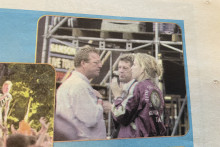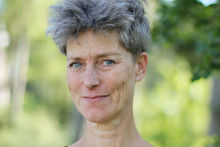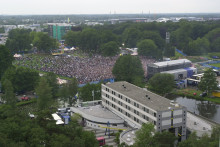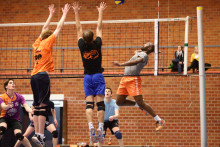25 years after the fireworks disaster
What impact did the Enschede fireworks disaster – exactly 25 years ago today – have on the University of Twente? With three stories, U-Today looks back to 13 May 2000, when a fireworks factory exploded in the Roombeek neighbourhood of Enschede. This is the story of the rector of the time: Frans van Vught.
He vividly remembers that he cycled to the city with his family that Saturday. And that the Van Heek square was difficult to reach due to renovation works. Once home – on his Usselo estate –he heard the bang. Van Vught initially thought of a huge bomb on that Van Heek square, but soon news of the disaster reached him.
'And I realised immediately; A lot of UT students live in that neighbourhood. So I started to form a crisis team on the spot. We had no experience with that at all, at the time. In what was then security building Charlie, we set up a team conference room. And gradually that day, of course, it became increasingly clear what kind of drama was taking place.'
Heavy heart
Van Vught says that the crisis team was focused on assisting students and staff. 'In those first few days, we had no idea whether and how many students and staff had been affected or killed. For days, I was under the impression that people from the university had died. At one point, we couldn't reach eight or nine students. There was nothing left but to call the parents, but I had a very heavy heart. Fortunately, the student associations from the Pakkerij did manage to trace those students. What a relief when they were found.'
Seventeen UT employees and more than fifty students lost their homes and possessions. Two students were injured to such an extent that they had to be admitted to hospital. Van Vught and his crisis team did everything in their power to accommodate those affected on campus as best they could. 'We arranged spaces in the Sports Centre and hotel Drienerburght (the current ATLAS building, ed.). Later we helped with the search for temporary housing, and if I remember correctly, we also took care of things such as new clothes.'
The tears of Mans
One of those with whom he maintained close contact in those days was UT student Danny de Vries, whose images of the fireworks disaster went all over the world. 'I had known Danny for some time, and eventually he found some peace in my garden a day after the disaster. Media outlets hounded him after his images went around the world. In the meantime, of course, Danny himself was also quite distressed by everything he had seen and experienced.'
Van Vught also remembers 'Mans' tears'. On Wednesday 14 June 2000, a month after the disaster, a benefit concert took place on campus. 'Mayor Jan Mans and I were supposed to open the concert there, and address the audience. But Mans was hesitant to climb that stage. He was afraid of being booed by an angry audience, because in those days much was still unknown about the circumstances of the disaster.' Once on stage, things took an unexpected turn. 'People were affectionately chanting his name: 'Jantje, Jantje'. It moved him enormously, and warmed his heart.'
Van Vught maintained a good relationship with the mayor until Mans passed away in 2021. His close ties gave UT another advantage when the so-called Faculty Club (a restaurant and meeting location on campus, ed.) was renovated. The fire brigade initially would not grant a permit because the ceiling was too low. 'Mans then suggested lowering the building slightly by excavating the floor. That's how the permit came about.'
New disaster
His role as a director taught Van Vught that it is important to be of service. And to ensure that others can do their work. 'As a director, you must coordinate, not steer. More importantly, it's not about you, and you shouldn't want to visit such a disaster site. There are other experts for that.'
The lesson came in handy for the rector when a new disaster struck in 2002, which had a much greater impact on the UT itself. The then TW/RC building (now Cubicus, ed.) partially burned down, and many offices went up in flames. Researchers stood by helplessly as their work was lost. The fire turned out to be deliberately lit. 'The fireworks disaster had taught us as management a lot about crisis situations. A few months before the UT fire, we had even followed special training for it. That helped a lot, especially in communication to the outside world.'
Whether the UT has changed after those two disasters, Van Vught cannot say. He did see a lot of togetherness developing. 'Even at student associations that normally never did anything together', he recalls. 'They suddenly started organising fundraisers together.' What was true was that it gave the UT – that small university in Twente – a lot of visibility. 'Nationally, but with the fireworks disaster also internationally. Suddenly, we were on the map.'






